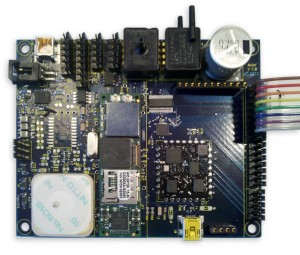Overview
The ATI Avior autopilot is an advanced design built around high performance, high quality, state of the art components and sensors. The CPU is a 600 Mhz OMAP 3503, offering 256 Mb of Flash and 256Mb of RAM. The core sensors include a Vectornav VN100T IMU and the Ublox Neo 6 GPS. The firmware is built around an advanced 15-state kalman filter that blends the inertial and gps sensor data to accurately estimate roll, pitch, and true yaw angles. The ATI Avior offers unprecedented performance, accuracy, and capabilities in a small package and at a competitive price.
Specifications
- Dimensions: 103mm x 82mm x 13mm
- Weight: 68grams
- Texas Instruments OMAP 3503 CPU (600 Mhz ARM Cortex-A8, up to 1200 Dhrystone MIPS)
- 256Mb RAM, 256Mb Flash, MicroSD slot
- I2C, SPI, 1-wire UART, High Speed USB Host and USB OTG, Ethernet
- 8 PWM in, 8 PWM out, 6 Analog in
- Professional double-sided SMT (Surface-Mount Technology) Mil-Spec available
- 5 – 44.4V input voltage range
- 0C < T < 85C rated
- VectorNav VN100/VN100T IMU
- Accelerometer range: +/- 2g / 6g
- Gyro range: 500 deg/sec
- Magnetometer range: 6 gauss
- Shock limit: 1000g (unpowered), 500g (powered)
- Advanced 15-state Kalman filter with true-heading estimation (INS/GNS)
- 100hz filter update rate
- Ublox Neo 6 GPS
- 5 Hz navigation rate
- Anti-jamming technology
- Cold starts: 26 s, Hot starts: 1s
- Radio modem: direct plug-in support for Digi 900 Mz XTend modem — serial or IP connection provided for external modemand hardware.
Firmware Specifications
- IMU based stabilization and flight control — 15-state Kalman filter provides accurate roll, pitch, and “true” yaw angle estimates
- WGS-84 (great-circle) route navigation
- Unlimited waypoints (limited only by hardware RAM.)
- Supports fixed waypoint routes and “pattern based” routes that can be repositioned at startup or during flight
- Accurate onboard wind vector estimation
- Stable heading control (even in high wind operations)
- Autonomous flight mode; Command Augmentation flight mode; Manual flight mode.
- Circle holds (wind compensated)
- Altitude hold (pitch-based or throttle based)
- Speed hold (pitch-based or throttle based)
- Lost link return home safety feature
- Includes drivers for additional sensors and hardware
- Extensive on board data logging
- Real-time air-to-ground communication via an open, well documented API
- Able to directly control servo based pan/tilt camera mechanism with support for WGS-84 point holds and NED vector holds
- Firmware uses a robust quaternion based formulation in combination with the Kalman filter based attitude estimate to compute the correct pan/ tilt angle offsets for pointing the camera at the intended target independent of aircraft motion
- Potential to leverage this internal math to drive more sophisticated stepper motor based pan/tilt mechanisms.
- Auto launch, auto land (under development)

